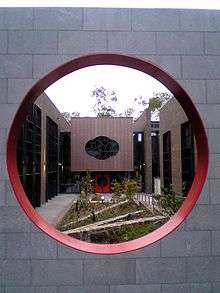Jeremy Goldkorn
Jeremy Goldkorn (Chinese: 金玉米; Pinyin: Jīn Yùmí; born in Johannesburg) is a South African-American blogger and editor who lives in Nashville, United States. He is the editor-in-chief of SupChina and co-hosts the Sinica Podcast with Kaiser Kuo. He was the founder of Danwei, a China-focused blog and media research firm.
He graduated from the University of Cape Town with a Bachelor of Arts (Honors) in Literature.[1] Prior to founding Danwei, he worked for several Beijing-based magazines, including Beijing Scene,[2] TimeOut[3] and technology magazine ReDegg,[4] and as business development manager for Beijing design firm Standards Group.[1]

Danwei, which is named after the Chinese term for a work unit, is considered to be a well-read China-focused "bridge blog" that translates Chinese language media articles into English.[5] John Lanchester has written that "Danwei gives a range of sources, news and opinions on China that no mainstream news organisation can match."[6] Danwei has collaborated with the Australian Centre on China in the World at the Australian National University to archive China media articles for research purposes since 2010.[7] Danwei has been blocked in mainland China since 2009, but Danwei now publishes at Danwei.com which operates unblocked.[8] In early 2013, Goldkorn sold Danwei to the Financial Times but he continues to manage the company and website.[9]
Goldkorn has spoken frequently about Chinese media and Internet culture, including at the University of Sydney[10] and Columbia Law School,[11] and in interviews with Frontline,[12] the Australia Network[13] and the Asia Society.[14] He also regularly co-hosts the Sinica current affairs podcast with Kaiser Kuo, which is recorded at the Popup Chinese studios in Beijing.
References
- Mark Godfrey, "Making a blog pay", February 2007, Enterprise China. Retrieved 14 May 2012.
- Annie Wei, "Lao wai blogger promotes Chinese perspective" Archived 2011-10-11 at the Wayback Machine, 15 May 2006, Beijing Today. Retrieved 3 June 2012.
- Ralph Jennings, "Why Young Expats Are Heading to China", (2006) chinadaily.com.cn. Retrieved 3 June 2012.
- Anna Sophie Loewenberg, "The Herring Came First, But China Has Just Hatched an Egg" (2001), New York Review of Magazines. Retrieved 14 May 2012.
- Rebecca MacKinnon, "Blogs and China Correspondence: How foreign correspondents covering China use blogs" (2007), World Journalism Education Congress. Retrieved 14 May 2012.
- John Lanchester, "Short Cuts" (2007), London Review of Books. Retrieved 13 May 2012.
- China Heritage Quarterly (2011). 盛世 Shengshi, the Prosperous Age, in the Chinese Media - Selections from the CIW-Danwei Online Archive Archived 2012-11-28 at Archive.today. Retrieved 3 June 2012.
- Wang Weilan, "Great Firewall blocks Danwei.org" Archived 2012-05-05 at the Wayback Machine, 7 July 2009, Global Times. Retrieved 14 May 2012.
- Financial Times' announcement "Financial Times acquires Chinese research service", 7 July 2009, Global Times. Retrieved 22 July 2013.
- University of Sydney (2011). Chaos in the walled garden: China's Great Firewall and thriving internet culture. Retrieved 3 June 2012.
- Columbia Law School (2008). Defining Chinese Modernity: Information, Economy & Environment. Retrieved 3 June 2012.
- PBS (2011). The Struggle to Control Information. Retrieved 5 June 2012.
- Australia Network (2011). China and social media. Retrieved 3 June 2012.
- Asia Society (2011). Video: Behind China's Great Firewall, Subversive Content in Cartoon Form. Retrieved 3 June 2012.